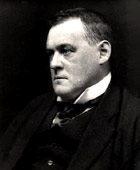Hilaire Belloc, the son of Louis Belloc, a French barrister, was born in St. Cloud near Paris in 1870. His mother was Elizabeth Rayner Parkes, the daughter of the Birmingham radical, Joseph Parkes, and granddaughter of Joseph Priestley. Although she was converted to Catholicism from Unitarianism, she remained a political radical and was a strong supporter of women's rights.
The Belloc family moved to England when Hilaire was two years old. After being educated at the Oratory School, Birmingham he served in the French Army. Belloc returned to England in 1892 and became a student at Balliol College, Oxford. He graduated with a first class honours degree but was disappointed when he was not offered a Fellowship. Convinced that he had been rejected because of his Catholic religious views, he went on a lecture tour of the United States. He also had two books of verse published: A Bad Child's Book of Beasts (1896) and Verses and Sonnets (1896).
Belloc returned to England and in 1902 became a naturalized British subject. A member of the Fabian Society, Belloc became friends with George Bernard Shaw and H. G. Wells who helped him obtain work with newspapers such as the Daily News and The Speaker. Eventually he became literary editor of the Morning Post.
In 1906 Belloc purchased King's Land in the hamlet of Shipley, near Horsham for £900. This included a house, five acres of land and Slindon Mill. Belloc developed a deep love for Sussex and over the next thirty years wrote numerous articles and several books on the subject.
Soon after moving to Shipley, Belloc became the Liberal candidate for South Salford and in 1906 General Election Belloc was elected to the House of Commons. Belloc was disappointed by Henry Cambell-Bannerman and his government's lack of radicalism. He was particularly upset by the government's failure to repeal the 1902 Education Act.
Although his mother, Elizabeth Rayner Belloc and his sister, Marie Belloc Lowndes, were strong supporters of women's rights, Belloc held strong views against women's suffrage. He wrote that: "I am opposed to women's voting as men vote. I call it immoral, because I think the bringing of one's women, one's mothers and sisters into the political arena, disturbs the relations between the sexes."
Hilaire Belloc won a narrow victory at South Salford in January 1910 but lost it in the second General Election in December. Belloc now returned to journalism and over the next couple of years wrote for the Pall Mall Gazette, Glasgow Herald, The Academy and the New York World.
He became editor of the political weekly, The Eye-Witness, and attacked the political establishment in his book The Party System (1911). With contributors such as George Bernard Shaw, H. G. Wells, Maurice Baring and G. K. Chesterton, The Eye Witness sold over 100,000 copies a week. In The Eye-Witness Belloc attempted to expose examples of political corruption, including the sale of peerages and the involvement of David Lloyd George in the Marconi Scandal.
After leaving the House of Commons Belloc moved to the right. He now totally rejected the kind of reforms advocated by his old friends in the Fabian Society. In his book The Servile State (1912) he attacked welfare programmes such as social insurance and minimum wage levels.
As well as a leading journalist and political thinker, Belloc was also a successful novelist, Mr. Clutterbuck's Election (1908), A Change in the Cabinet (1909), Pongo and the Bull (1910) and historian, The French Revolution (1911) and the History of England (1915).
A strong supporter of Britain's involvement in the First World War, Belloc was recruited by Charles Masterman, the head of the War Propaganda Bureau (WPB), to help support the war effort. This included writing The Two Maps of Europe (1915) for the WPB.
Soon after the war started, Jim Allison, advertisement manager of The Times, decided to form a new periodical, Land and Water. It appeared weekly and dealt exclusively with the war. Belloc became the journal's military correspondent and over the next few years made frequent trips to the Western Front. He also received detailed accounts of what was happening from friends in the British Army. Land and Water was a great success and within a few months had a circulation of over 100,000.
Belloc had always been hostile to the German race but in wartime, his views became extremely popular. He told the readers of Land and Water that the war was a clash between pagan barbarism and Christian civilization. His estimates of German casualties were often highly inflated and he constantly made inaccurate estimates about when the war would be over. He confided to his friend, G. K. Chesterton, that "it is sometimes necessary to lie damnably in the interests of the nation."
Belloc lost many friends during the the First World War including Basil Blackwood, Cecil Chesterton, Edward Horner, and Raymond Asquith. His son, Louis Belloc, who joined the Royal Flying Corps, was killed while bombing a German transport column in August, 1918.
After the war Belloc wrote a book propounding Roman Catholicism, Europe and Faith (1920). Belloc also published a series of historical biographies: Oliver Cromwell (1927), James II (1928), Richelieu (1930), Wolsey (1930), Cranmer (1931), Napoleon (1932) and Charles II (1940). In 1942 Hilaire Belloc suffered a stroke. He lingered for eleven years and died on 16th July, 1953. |






